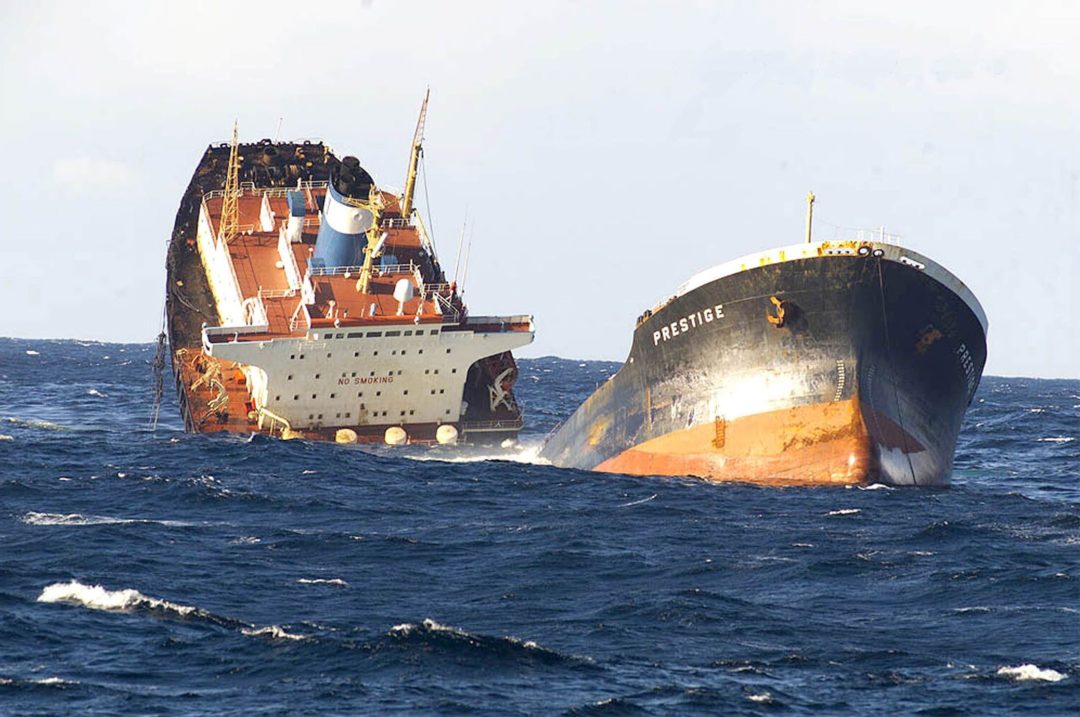
Home » Aging Shadow Fleet Carrying Russian Oil Poses Disaster Risk
Aging Shadow Fleet Carrying Russian Oil Poses Disaster Risk

March 29, 2023
The oil tanker Turba normally should have been melted down by now.
The 26-year-old vessel hasn’t had a full inspection since 2017, according to a database dedicated to promoting safe shipping. It also lacks industry standard insurance and sails under the flag of country with a poor standing for the oversight of maritime safety.
But rather than being steered onto a beach in Bangladesh, India or Pakistan for dismantling, the 1997-built tanker is collecting heavy fuel at the Russian port of St. Petersburg.
The aftermath of European Union sanctions on Russia mean that the Turba has been enlisted into a vast shadow fleet carrying Moscow’s oil around the globe. Its continued operation is a stark reminder that Group of Seven sanctions on Moscow carry an environmental risk.
The big concern is that some older vessels — the global fleet is now the oldest in almost two decades — may not be properly inspected and maintained, leading to a catastrophic accident at sea.
“They’re an environmental disaster waiting to happen,” said Lars Barstad, chief executive officer of the management unit of Frontline Plc, one of the largest owners of supertankers.
In normal times, owners start to consider demolishing tankers when they’re about 15 years old. By year 20, the ships’ fate — to be sold for scrap — is usually sealed.
Right now, though, shipowners are squeezing a few more years out because there’s money to be made.
The sanctions imposed December 5, 2022, are forcing vessels to sail thousands of miles further, boosting demand and freight rates.
Inspections
At least 40 vessels hauling Russian oil to China and India between early December and early February lacked insurance from members of the International Group of P&I clubs or routine safety-management certificates, according to data from Equasis, the maritime safety database. Three, including the Turba, didn’t have something called classification that would demonstrate how seaworthy they are.
The Turba brings up uncomfortable memories of one of the worst oil spills from a tanker in European history.
The tanker Prestige broke in half and leaked thousands of tons of heavy fuel oil onto the coast of Spain in November 2002.
Seabird populations and fisheries were devastated, and beaches in Spain and Portugal were ruined.
The Turba is the same age as the Prestige was, and it just collected the same type of cargo from the same Russian port, according to data from Kpler, a shipping analytics firm.
Russia’s Ministry of Transport, the nation’s Federal Agency for Maritime and River Transport, and Rosmorport, an entity that oversees port infrastructure, didn’t respond to emailed requests for comment. Spain’s merchant navy pointed out that it cannot control activity outside its territorial waters.
Good Reasons
There are sound reasons for scrapping tankers by the time they’re 20. Often, it’s about the cost of trying to keep them in service as safety and maintenance requirements become more onerous.
But there is also the effect of years of pounding waves, salt-water corrosion and near-constant use that place a strain on hull integrity and propulsion systems.
Tankers normally receive inspections — known as special surveys — about every five years. By the fourth time around, the economics of continuing to trade diminish sharply. The surveys can cost $3 million to $4 million for big tankers, and they will then require an intermediate inspection about 2 1/2 years later.
Port authorities also tend to scrutinize older ships more closely. The increased expenses, and the lack of customers, would — in normal times — encourage owners to sell them for scrap.
“Everything needs looking at — steel, engine,” said Halvor Ellefsen, a shipbroker at Fearnleys Shipbrokers UK Ltd. who’s worked in the industry for almost four decades. “The older they are, the more they find.”
European Cutoff
The EU, for years the top buyer of Russian oil, banned almost all seaborne exports from its one-time trading partner and joined the G-7 in capping the price of Moscow’s crude at $60 a barrel. It’s still possible to transport Russian oil at prices above the threshold but not with Western services such as insurance, crewing, vessel classification, financing and transport.
The net effect has been an increase in long-distance deliveries to Russia’s big remaining markets in Asia and the creation of a shadow fleet of tankers operating outside the sphere of G-7 companies.
The traders and shipping firms doing these deals often have opaque ownership structures.
2022 saw a surge in sales to unknown buyers, with 100-plus oil and fuel tankers changing hands. Over the same period, there also was a sharp decline in the number being scrapped, according to Clarkson Research Services Ltd., a unit of the world’s oldest shipbroker.
Some of the aging ships are transferring their hazardous cargoes on the high seas, often in international waters off Greece or the Spanish exclave of Ceuta in north Africa.
“This is a huge environmental risk,” said Adi Imsirovic, a veteran oil trader who’s now director of the Surrey Clean Energy consultancy. “Tankers that should have been scrapped by now are doing loads of ship-to-ship transfers of millions of barrels of oil without proper insurance.”
The Turba recently transported Urals — Russia’s flagship crude grade — to India and loaded heavy fuel oil in the port of St. Petersburg, according to Kpler. If it sails to Asia, it will involve navigating the Baltic Sea and passing several European coastlines.
The Aframax-class vessel’s owner is Scoot Chartering Corp., which is registered in the Seychelles, according to IHS Maritime data compiled by Bloomberg. Its last class renewal survey was in 2017. Its class was withdrawn by Bureau Veritas in 2021, the Equasis database shows.
High Risk
Half-a-dozen tanker brokers and owners said they didn’t have a means to contact Scoot, which doesn’t appear on a Seychelles corporate register.
The tanker flies the flag of Cameroon, one of a handful of blacklisted countries under something called the Paris MOU, an international organization that promotes and coordinates safe shipping. It’s the only blacklisted nation that also has a “high risk” designation.
Approval by a member of the International Association of Classification Societies — which the Turba lacks, according to Equasis — means an audited international body of surveyors will have checked a vessel to monitor that its hull is structurally sound, and its propulsion, steering and power systems are reliable and functional.
The average age of the tanker fleet is now 12 years, according to data from Clarkson. Almost a third of vessels are older than 15, and the ranks of aging vessels is forecast to expand rapidly in coming years, said Svein Moxnes Harfjeld, CEO of DHT Holdings, an oil tanker company.
Given the lack of clarity around ownership, it’s likely the new operators don’t have the same levels of experience and professionalism normally associated with the Russian fleet, Ben Luckock, co-head of oil trading at Trafigura Group, said at an FT Commodities Global Summit in Lausanne, Switzerland, this week.
“You’ve got a lot of 17-, 18- and 19-year-old boats transiting the Danish straits with the oil,” he said. “We have changed the logistics skillset around Russian oil in a very short period.”
RELATED CONTENT
RELATED VIDEOS
Subscribe to our Daily Newsletter!
Timely, incisive articles delivered directly to your inbox.
Popular Stories

2024 Supply Chain Management Resource Guide: There's Only One Way Off a Burning Platform
VIEW THE LATEST ISSUECase Studies
-
Recycled Tagging Fasteners: Small Changes Make a Big Impact
-

Enhancing High-Value Electronics Shipment Security with Tive's Real-Time Tracking
-

Moving Robots Site-to-Site
-
JLL Finds Perfect Warehouse Location, Leading to $15M Grant for Startup
-
Robots Speed Fulfillment to Help Apparel Company Scale for Growth



